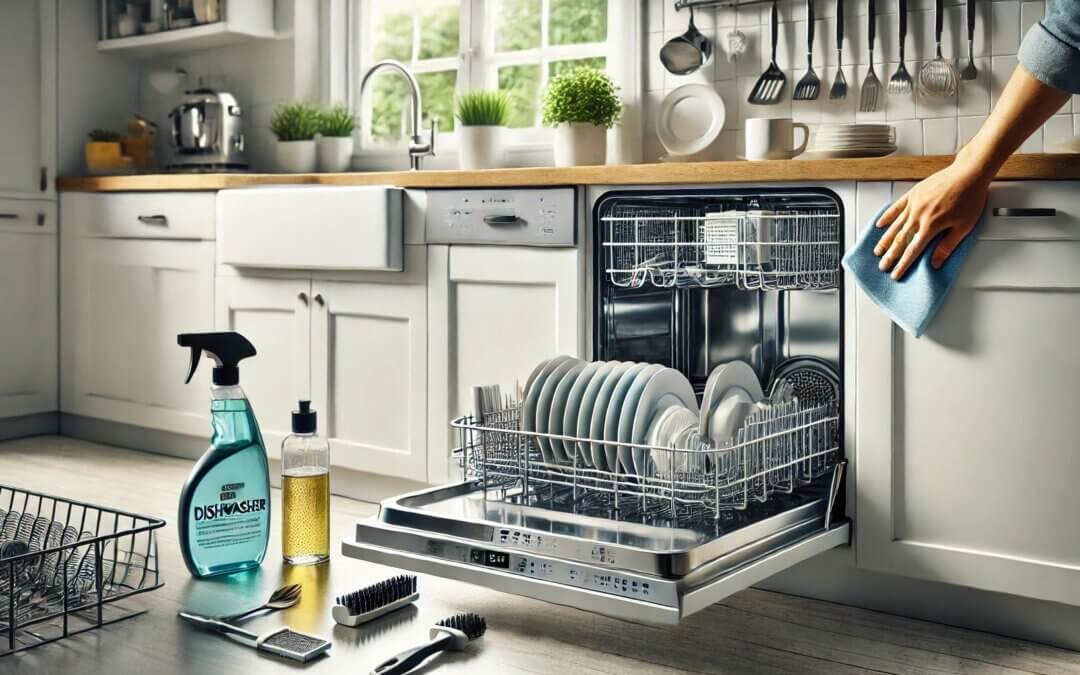Table of Contents
- 1. Clean the Dishwasher Filter Regularly
- 2. Run Hot Water Before Starting a Cycle
- 3. Inspect and Clean Spray Arms
- 4. Check and Clean Door Seals
- 5. Use the Right Detergent and Water Softener
- 6. FAQs
1. Clean the Dishwasher Filter Regularly
One of the simplest yet most effective dishwasher maintenance tips is cleaning the filter. Over time, food particles, grease, and other debris build up in the filter. If it’s not cleaned regularly, your dishwasher won’t clean properly and may even break down.
- Why it’s important: A clogged filter forces your dishwasher to work harder, reducing its efficiency and possibly causing blockages that lead to breakdowns.
- How often to clean: Clean the filter once a month to keep your dishwasher running smoothly.
- Steps for cleaning:
- Turn off the dishwasher.
- Remove the lower rack to access the filter.
- Unscrew or lift the filter, then rinse it under warm water to remove all debris.
- Use a soft brush to scrub off any stubborn particles.
Pro Tip: Soak the filter in soapy water for 10-15 minutes if it’s especially greasy. This helps to break down the buildup and improve dishwasher efficiency.
2. Run Hot Water Before Starting a Cycle
Running hot water before starting your dishwasher is a simple way to boost cleaning performance and prevent unnecessary strain on the appliance. This step ensures that your dishwasher starts with hot water, which is crucial for proper cleaning.
- Why it helps: Hot water dissolves food residue and grease more effectively. Starting a cycle with cold water forces the dishwasher to work harder to heat the water, which can wear out components over time.
- How to do it: Run your sink’s hot water for about 30 seconds before starting the dishwasher. This ensures hot water enters the machine immediately.
By incorporating this easy habit into your routine, you can help prevent dishwasher breakdowns and improve cleaning efficiency.
3. Inspect and Clean Spray Arms
Spray arms are essential for circulating water throughout the dishwasher. However, they can get clogged with food particles, soap scum, and mineral deposits, reducing cleaning performance and putting stress on the machine.
- Why it’s important: Clogged spray arms prevent water from reaching all areas of your dishes, leading to poor cleaning results and a harder-working dishwasher.
- Steps to clean spray arms:
- Remove the top and bottom racks to access the spray arms.
- Carefully unscrew or snap off the spray arms.
- Use a toothpick or small wire to clear any clogged holes.
- Rinse the spray arms under running water before reattaching them.
Regularly cleaning the spray arms is a key step in your dishwasher care guide that can help you avoid dishwasher repairs and ensure your machine functions well.
4. Check and Clean Door Seals
The rubber door seal (gasket) forms a watertight barrier when your dishwasher is running. Over time, dirt and food particles can accumulate in the seal, or the rubber may become worn, leading to leaks and possible damage to your kitchen.
- Why it matters: A dirty or damaged door seal can cause leaks that not only damage your kitchen floor but also lead to bigger problems in the dishwasher itself.
- How to clean:
- Wipe the door seal with a damp cloth and mild detergent, focusing on any folds where grime might hide.
- Check for cracks or signs of wear. If the seal is damaged, it may need to be replaced.
Pro Tip: Regularly cleaning the door seal after every few washes helps extend your dishwasher’s lifespan and prevents leaks before they start.
5. Use the Right Detergent and Water Softener
Using the right detergent and water softener is one of the most important dishwasher maintenance tips for keeping your machine in top condition. Incorrect detergent or hard water can cause soap buildup and mineral deposits that reduce performance over time.
- Why it’s important: Using too much detergent or the wrong type can leave residue on dishes and inside the dishwasher. Hard water can lead to mineral deposits that clog components.
- What to do:
- Choose a detergent specifically formulated for dishwashers and follow the dosage recommendations.
- If you notice chalky, white residue on your dishes or inside the dishwasher, consider using a water softener to prevent hard water buildup.
- Run a dishwasher cleaning solution once a month to clear away detergent residue and mineral deposits.
By following this tip, you can easily **avoid dishwasher repairs** and keep your appliance running smoothly for years.
FAQs
- 1. How often should I clean my dishwasher?
- Cleaning your dishwasher’s filter and spray arms at least once a month is recommended. For a deeper clean, use a dishwasher cleaner every 1-2 months.
- 2. What causes dishwashers to break down?
- Breakdowns often occur due to clogged filters, spray arms, or worn-out door seals. Regular maintenance can prevent most common issues.
- 3. Can I use regular dish soap in my dishwasher?
- No, using regular dish soap can cause excess suds, leading to leaks or damage. Always use detergent made specifically for dishwashers.
- 4. What’s the best way to prevent hard water buildup?
- Using a water softener is the most effective way to prevent hard water buildup, which can damage your dishwasher and reduce efficiency.
- 5. How can I make my dishwasher last longer?
- Follow these **dishwasher maintenance tips**: clean the filter and spray arms regularly, use the right detergent, and check the door seals to prevent leaks.
More Helpful Resources
For more appliance care and troubleshooting tips, check out these useful guides:


